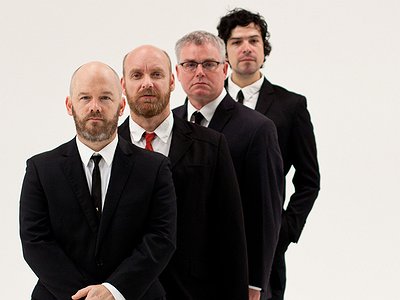Squat mentality
The relationship between music and other forms of art – painting, video art and cinema most importantly - has become increasingly important. How do you see this relationship yourself and in how far, do you feel, does music relate to other senses than hearing alone?
Music is used differently than any other medium. We can drive with it on, talk with it on, dance with it on, sing with it, use it in every way possible and multiple times in a row. It lives in our heads constantly. One thing I like that is happening, is that music and film are coming together and you have many more people putting them in the same room for live soundtrack events. I work with a couple of filmmakers who are really into doing live presentations with film and music. Brent Green and Sam Green are their names. They are not brothers. Brent does stop-motion animated narratives, and Sam does more documentary events, but with a script. Both ultimately achieve the same utopian vibe: people coming together to experience something as a group, away from their fucking computers.
There seem to be two fundamental tendencies in music today: On the one hand, a move towards complete virtualisation, where tracks and albums are merely released as digital files. And, on the other, an even closer union between music, artwork, packaging and physical presentation. Where do you stand between these poles?
I love making vinyl but it hasn't changed, so all the mastering and printing and everything takes forever and ultimately you do the same amount of production work but you only sell a few thousand so it ends up feeling kind of silly. Though, a record doesn't feel like a record without a record. It's one more argument against the people who want the world to be free and transient and meaningless. It is an object. If I didn't make so much out of it I'd be much happier. I'm obsessed with the process of releasing records that no one really wants. This makes no sense. I just want people to want to buy records and have record stores and meet there and collect things, but that train has left the station, especially in America. Brighton still has some great ones though.
The role of an artist is always subject to change. What's your view on the (e.g. political/social/creative) tasks of artists today and how do you try to meet these goals in your work?
There's always a need for a communion. People coming together in any form is holy, we need it. Artists provide a reason for us to come together, dance, read, discuss, and be a community.
I really think there is no substitute for being together in body and mind. You may be sensing right now my disgust with having to sit in front of the computer constantly. Mind you, I don't mind writing. Writing isn't that bad. At least I feel like I'm talking to you now. But it's simple displacement theory. If I spent all my time on a computer facing away from my family and friends and all the junk that is piling up in my house, and the bills and the dog, then I am truly being neglectful of the people who mean the most to me. They should matter more than you dear reader.
Music-sharing sites and -blogs as well as a flood of releases in general are presenting both listeners and artists with challenging questions. What's your view on the value of music today? In what way does the abundance of music change our perception of it?
On tour I have found some profoundly different approaches to music. I have seen cities that just follow around what's hot, and then I have seen cities that still have a bunch of places where the place is more important than the music, and so the community goes and watches the bands no matter who is there because it was chosen by a curator type who thinks he might want to support a certain band. Those are very different approaches. I sort of miss the second approach a bit. Now, in this age of a million bars and mixologists, we have a huge gap between the bands and the audience. The bands play at places that don't have any interest in cultivating a community per se. They want customers. Nothing inherently wrong with that, but it's very different to a squat mentality, where a place is a refuge for the people. I can only tell you that it always feels better to play the squat.
How, would you say, could non-mainstream forms of music reach wider audiences?
I really have no idea. Fugazi still reaches a lot of people but Deathfix doesn't. Granted we are a very young band (no comments please), and even Fugazi, when we just had one record out, didn't sell very many, maybe a few thousand. But if you ask me how to reach wider audiences I would say put out a record, maybe make a video, and there's no shortage of ways for people to hear or see what you are doing. If it resonates with people then they will pick up on it. If not, they won't. Obviously Deathfix doesn't resonate with people in the same degree that Fugazi does, just based on the numbers. But the people we resonate with seem to really like it. That action happens at our live gigs more that anything. That's about the only thing that saves me from rubbing myself out when I look at the numbers.
Usually, it is considered that it is the job of the artist to win over an audience. But listening is also an active, rather than just a passive process. How do you see the role of the listener in the musical communication process?
Yeah, The listener has to put her time in. Great records don't just make sense on first listen. Great records are game changers and you hate the shit out of them for a while. Most of my favourite records were like that.
Reaching audiences usually involves reaching out to the press and possibly working with a PR company. What's your perspective on the promo system? In which way do music journalism and PR companies change the way music is perceived by the public?
We use a very small amount of PR, but it's very effective. Aaron Leitko at Dischord is amazing at getting things into the right places on the web. He sort of just reaches out and people respond. I think because Dischord has rightfully built up a lot of good will, people are more apt to write about things they do. So, it doesn't feel like we are engaging the machine. Perhaps we are though. The machine could be just the willingness to just subscribe to endless self-promotion, which is what the Internet has forced us into. Deathfix spend an inordinate amount of time trying to get people to their gigs via Twitter and Facebook and Instagram, and it's still really, really hard on the road.
Perhaps the most sensible thing to do is to pay someone else to do your hawking. That may be the most spiritually liberating avenue. I will let you know.
Please recommend two artists to our readers which you feel deserve their attention.
How about Prince Rama, and Father John Misty. Two very different acts, but Father John Misty also counts as a comedian because he is so damn funny.






